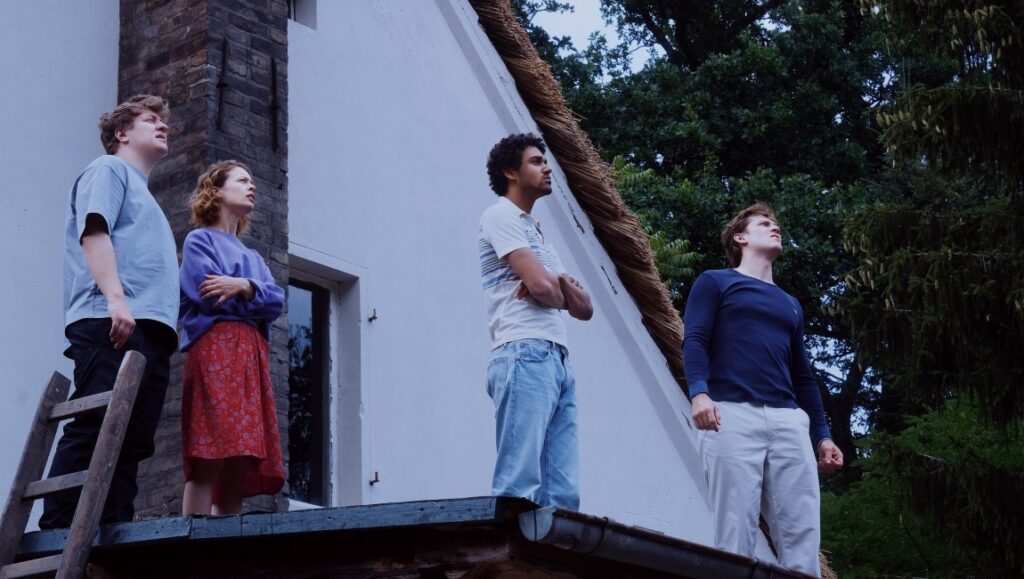In Christian Petzold’s latest film, sexual tensions rumble with such intensity that the only natural outcome is the eruption of a devastating forest fire. Afire is something of a reinvention for Petzold, moving away from the politico-historical drama (which dominated his filmography from Barbara to Transit) and into the realm of the Rohmerian summer sex comedy. Set to the perpetual buzz of insects, Afire encircles the bubbling tensions amongst four friends — Leon, Felix, Nadja, and Devid — vacationing near the Baltic Sea, where the complex social-sexual weavings between the quartet slowly become overshadowed by a forest fire burning on the horizon.
At the core of Afire is its protagonist, Leon, and his total absence of charisma. He’s a textbook curmudgeon, forever downcast; whichever bed he sleeps in has only wrong sides. He’s a caricature of every insecurity imaginable, yet also a surrogate for the worst vices of the artist archetype. His anxiety envelops his writing and his need for artistic validation. His sophomore manuscript is called Club Sandwich, and it’s packed with pretentious, cleavage-centric prose. Throughout the film, characters quietly eviscerate Leon’s work, tossing his ego into a blender, and sending him into a hostile frenzy of self-loathing. The only inkling toward Leon’s capacity for affability is his friendship with Felix. Throughout the movie, he treats Felix with scoffs and impatience — there’s no tenderness, no compassion. Yet the presence of this friendship, now plagued by Leon’s insecurities, suggests a past-Leon capable of navigating meaningful human connection, though now, he’s only a void of resentment. Petzold captures the chasm between the two men’s outlooks through their individual getups: the laidback and open-hearted Felix saunters about, stripped-down to sandals and swim trunks; Leon, on the other hand, is always overdressed, moping about in a cardigan, long sleeves, and slacks — he wears his discomfort on his body.
Leon spends the movie dodging any social excursion. “My work won’t allow it,” he mutters like his own version of Patrick Bateman’s, “I have to return some videotapes.” Instead, he stands on the outskirts, watching his companions’ pleasure. Leon’s gaze is a look of desire, yearning for both the sexual and emotional liberty the others exhibit so freely. Looking becomes a self-pitying act, reflected inward towards himself. To see others and recognize their pleasure only accentuates the misery he condemns himself to. No matter how many (overly generous!) offers Leon receives to join outings, he rejects them plainly. Self-removed from the social drama, Leon becomes an interpreter of looks; in his sphere of self-centric self-loathing, all gestures from afar read as chastisements of himself.
But above all, Leon is a tornado of repression. Awoken by the sounds of Nadja and Devid’s furniture-rattling sex in the other room, an agitated Leon decides to sleep outside. Afterwards, a nude Devid steps out and wanders into the woods, followed by Leon’s watchful eye, and Petzold uses these POV shots to imitate desire — Leon is constantly eyeing his three companions with unspoken longing. The excitement of Afire, then, comes in how its sexual dynamics spiral out into all directions — from an early homoerotic wrestling match, it’s clear that any combination of characters might suddenly erupt into furious lovemaking, Leon included.
The film begins with serene landscapes, from beaches to fields of tall, windswept grass (a recurring image in Barbara, too). Yet as the forest fire approaches, Petzold leans into a vocabulary of apocalyptic imagery. The vacation turns into an inferno, red flames engulfing the blue night sky and ash raining down. By the time we’ve launched into the heart of the natural disaster, Afire has become a very different film. Leon, who resonates as little more than a gag, becomes the lynchpin of a melodrama about love, mortality, and artistic creation. The dramatic pivot occupies a space of sincerity its larger-than-life protagonist cannot co-exist with; his wavelength is that of a cartoon. But in an attempt to pull the rug out from under his audience via bold tonal shift, Petzold loses his footing and tumbles along with us. It’s a shame because, otherwise, his work feels so invigorated here: infinitely funnier than ever, and cognizant of how to pack a scene with so much unspoken desire that it totters on the constant verge of explosion.
Published as part of InRO Weekly — Volume 1, Issue 28.


Comments are closed.